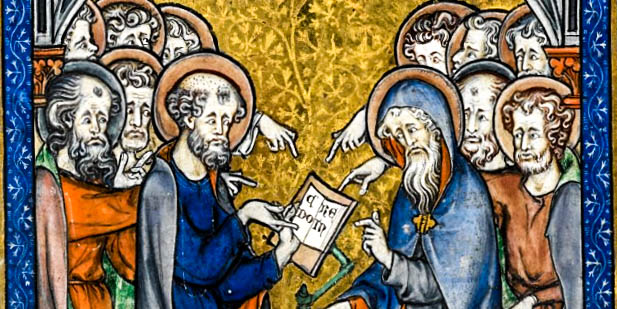NOT many people in the Church know the Apostles’ Creed. So, what is the Apostles’ Creed? And, why is it called so? In this article, ABHILASH PULICHANICKAL explains about the Apostles’ Creed, its origin, and its usefulness to the Church today.
The text of the Apostles’ Creed:
I believe in God, the Father Almighty, Creator of heaven and earth.
I believe in Jesus Christ, His only Son, our Lord,
who was conceived by the Holy Spirit
and born of the virgin Mary.
He suffered under Pontius Pilate,
was crucified, died, and was buried;
He descended to hell.
The third day He rose again from the dead.
He ascended to heaven
and is seated at the right hand of God the Father Almighty.
From there He will come to judge the living and the dead.
I believe in the Holy Spirit,
the holy catholic church,
the communion of saints,
the forgiveness of sins,
the resurrection of the body,
and the life everlasting. Amen.
THE Apostles’ Creed is a statement of Christian faith that has been used by many different Christian denominations throughout history. Although it is called the Apostles Creed, the apostles did not write it. It is believed to have originated in the early Christian church at least 150 years after the death of the apostles. It is called the Apostles’ Creed because it is based on the teachings of the apostles.
The creed is a concise summary of the basic beliefs of Christianity, and it is divided into three sections that focus on God the Father, Jesus Christ, and the Holy Spirit.
In its brevity it is matchless, in its order it is beautiful and sets forth the Christian doctrine in ‘sublime simplicity.’
Why does the Church need the Apostles’ Creed?
In 2019, R Albert Mohler Jr wrote an article on the Apostles’ Creed in Lifeway Research where he defended the need for the creed in the church. He said: “A cultural revolution has swept across the West, blurring the lines between reality and fiction. Entire Christian denominations have capitulated to the whims of this revolution and surrendered the fundamental truths of their faith. In this surrender these churches have lost their identity as God’s people.
“All churches, therefore, must recapture and reinvigorate their zeal for all the doctrines contained in the Apostles’ Creed. Each and every credo encapsulates the very essence and foundation of what the people of God believe—and what they have always believed.
“In light of this reality, Christians must stand firm and stand together on the essential truths of Scripture. The church fathers understood this fact, which is why they labored so diligently to give the church faithful summaries of Scripture’s teaching, like the Apostles’ Creed.”
The 2,000 year old text of the Apostles’ Creed stands alongside the Ten Commandments and the Lord’s Prayer in its utility and popularity. The creed reminds believers of Jesus Christ of the central tenets of their faith, clarifies Scriptural revelations about Lord Jesus and how the Christ secured our redemption.
The holy catholic church mentioned in the creed should not be confused with the Catholic church. The word catholic in the Apostles’ Creed simply means universal church. The true “catholic” church refers to all those who have placed their faith in Jesus Christ for salvation.
Likewise, the name Apostles’ Creed does not mean the apostles wrote the creed. They did not. The creed simply reflects the early church’s effort to express and summarizes the faith given by Christ to the apostles.
The creed affirms the doctrine of the church
There are those who say the Church does not need the creed but the naysayers do not seem to realize the fact that the Apostles’ Creed is a digest of the doctrine of the Church. The creed confirms the doctrine of the Triune God. The Father God, who is the Creator of all things, Jesus the Son of God who is the only Savior and the Holy Spirit who is not only the Author and Finisher of our Faith but also the One who unites us to Christ. The creed affirms the fundamental historical facts of the Gospel namely the virgin birth of our Lord, His suffering on the cross, His death and bodily resurrection. The creed also sets forth Jesus’ descent into hell, His resurrection and His ascent into heaven where Jesus rules over all now. The creed also affirms that Jesus will return at the end of the age to judge the world and raise the dead.
Should the Church recite the Apostles’ Creed?
Most certainly. Its recital week after week affirms the believers’ faith in the doctrine found in the Bible and expounded by the apostles and the early church fathers. By affirming it regularly, the doctrine of the Christian faith is etched deeply in the believers’ heart.
The use of the Apostles’ Creed in Christian worship and practice varies among different denominations and traditions. However, for many Christians, the creed serves as a concise and accessible summary of the core beliefs of the faith, and is used as a statement of belief during worship services, baptismal ceremonies, and other occasions.
One of the benefits of the Apostles’ Creed is that it provides a shared foundation of belief for Christians across different denominations and traditions. By affirming the basic tenets of the Christian faith, the Creed helps to foster unity and a sense of common purpose among believers.
Moreover, the creed has historical and theological significance, as it reflects the teachings and beliefs of the early Christian church. It serves as a link to the faith of the apostles and the earliest Christian communities, and reminds Christians of the foundational beliefs that have sustained the faith over the centuries.





















